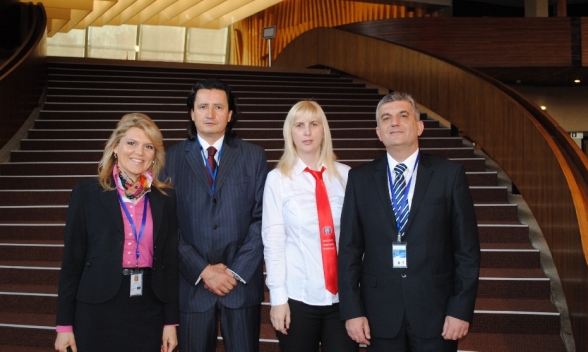In the Resolution adopted after a very interesting debate, the Council of Europe Parliamentary Assembly concluded that the "so-called referendum" in Crimea was unconstitutional. According to the opinion of the majority of PACE parliamentarians, the secession of Crimea and its integration to the Russian Federation had been encouraged by the Russian authorities, and the PACE did not recognize the outcome of the referendum and the illegal annexation of Crimea by the Russian Federation, while the Assembly fully supported the legitimacy of the new government in Ukraine, which is expected to create opportunities for the country's democratic development. The Parliamentary Assembly has called on the Ukrainian authorities to adopt amendments to the Constitution, which should be aligned with the standards of the Council of Europe, in order to establish a balance between the executive and legislative branch.
During the day, discussions on internet access were led at the plenary, on consumer protection and safety in cyberspace, the right of access to citizenship and implementation of the European Convention on Nationality.
Ms Snežana Jonica participated in the discussion on the right of access to citizenship and implementation of the European Convention on Nationality. She emphasized that the right to nationality was in substance the right to the realization of other rights. She supported the view that children should have the nationality of both parents and pointed to a number of problems and possible discrimination when it was not authorized by laws of Member States. She also drew attention to the problem that the implementation of the recommendation that children should have the nationality of both parents, in some countries, such as Montenegro, may be included in the interpretation of the term "children", if this term was interpreted in a way that benefits only applied to persons under the age of 18. She pointed to the problem of interpretation of the duration of the residence permit and supported the recommendation that the residency requirement for the citizenship must not be more than five years. Ms Jonica drew attention to the importance of Article 6 of the Resolution, which stated that allowing multiple citizenship had been generally accepted trend in the last decades, due to the increased movement of people and intermarriage. Article 6 stipulates that a waiver of citizenship of the parent should not be a requirement for citizenship. She supported the recommendation for re-establishment of a committee for addressing the issue of citizenship. Ms Jonica expressed her hope that the adoption of this Resolution should have an impact on the acceptance of the Proposal of the Law on Amendments to the Law on citizenship by other members of the Parliament of Montenegro, which was submitted by the Socialist People's Party.
In the Resolution adopted after the debate on access to the Internet, PACE called on European governments to guarantee access to each individual, both on the normative level, and in practice, and to establish standards of service in this area, bearing in mind that communication via the Internet was an important form of communication between people and had enabled citizens to better and more easily take advantage of the right to freedom of expression. The Assembly concluded that special attention should be paid to the protection of data on the Internet and invited undertaking a series of measures, including the adoption of an action plan by the European states to prevent massive violations of the right to privacy and laws to regulate this area in a manner compatible with European Convention on Human Rights which guarantees the right to privacy.
Mr Heinz Fischer, the President of Austria, addressed the PACE, as part of his official visit to the Council of Europe. The day before the Parliamentary Assembly of the Council of Europe, when considering the previously ratified accreditations of the Russian delegation to the PACE, should decide whether to suspend the right of Russia to vote by the end of 2014, the President of Austria said to members of PACE that dialogue was the only way to resolve conflicts. “It Is pretty easy to close the door, but it is far more difficult to open them again “, Mr Fischer pointed out while addressing the members of PACE. Mr Fischer stated that he agreed with the assessment of the experts of the Venice Commission that the actions that Russia has undertaken were in contravention with international law, but stressed that further steps that Russia would take in the destabilization of Ukraine were unacceptable. He called on the member states of the Council of Europe to consider the historical background of the conflict, respecting the interests of all countries involved. The Austrian President commended the role of the Council of Europe, as an international organization that has demonstrated an important role in maintaining peace in Europe.
Members of the delegation of the Parliament of Montenegro to the Council of Europe Parliamentary Assembly participated in the meeting of the Socialist Group and meetings of the Committee on Legal Affairs and Human Rights and the Committee on Social Affairs, Health and Sustainable Development. In addition, they attended the hearing on "The need to eliminate statelessness", organized by UNHCR, the Committee on Migration, Refugees and Displaced Persons, and the Committee on Legal Affairs and Human Rights of the Parliamentary Assembly of the Council of Europe.
Head of the delegation of the Parliament of Montenegro to PACE, Mr Predrag Sekulić, participated in the meeting of the President of the Parliamentary Assembly with heads of national delegations.
Montenegrin delegation on the April Session was composed of: Mr Predrag Sekulić, head and members - Ms Draginja Vuksanović, Mr Mladen Bojanić and Ms Snežana Jonica.









